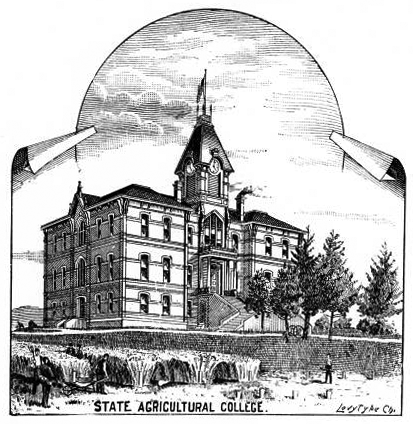|
National Pesticide Information Center
The National Pesticide Information Center (NPIC) is a collaboration between Oregon State University and the United States Environmental Protection Agency to provide objective, science-based information about pesticides, the recognition and management of pesticide poisonings, toxicology and environmental chemistry. It is funded through a cooperative agreement that is competitively awarded to an eligible applicant every 3–5 years. It was previously known as the National Pesticide Telecommunication Network. History The program was first established in 1978 as a toll free telephone service at the Texas Tech University Health Sciences Center to assist medical professionals with the recognition and management of pesticide poisonings. The service was later expanded to the general public. In the mid 1980s the NPIC moved to Texas Tech University and became the National Pesticide Telecommunications Network. In 1995 the program was moved to Oregon State University (OSU) and the name was ... [...More Info...] [...Related Items...] OR: [Wikipedia] [Google] [Baidu] |
Oregon State University
Oregon State University (OSU) is a Public university, public Land-grant university, land-grant, research university in Corvallis, Oregon. OSU offers more than 200 undergraduate-degree programs along with a variety of graduate and doctoral degrees. It has the 10th largest engineering college in the nation for 2022. Undergraduate enrollment for all colleges combined averages close to 32,000, making it the state's largest university. Out-of-state students make up over one-quarter of undergraduates and an additional 5,500 students are engaged in graduate coursework through the university. Since its founding, over 272,000 students have graduated from OSU. It is Carnegie Classification of Institutions of Higher Education, classified among "Doctoral Universities – Very high research activity". Chartered as a land-grant university initially, OSU became one of the four inaugural members of the National Sea Grant College Program, Sea Grant in 1971. It joined the National Space Grant Co ... [...More Info...] [...Related Items...] OR: [Wikipedia] [Google] [Baidu] |
United States Environmental Protection Agency
The Environmental Protection Agency (EPA) is an independent executive agency of the United States federal government tasked with environmental protection matters. President Richard Nixon proposed the establishment of EPA on July 9, 1970; it began operation on December 2, 1970, after Nixon signed an executive order. The order establishing the EPA was ratified by committee hearings in the House and Senate. The agency is led by its administrator, who is appointed by the president and approved by the Senate. The current administrator is Michael S. Regan. The EPA is not a Cabinet department, but the administrator is normally given cabinet rank. The EPA has its headquarters in Washington, D.C., regional offices for each of the agency's ten regions and 27 laboratories. The agency conducts environmental assessment, research, and education. It has the responsibility of maintaining and enforcing national standards under a variety of environmental laws, in consultation with state, ... [...More Info...] [...Related Items...] OR: [Wikipedia] [Google] [Baidu] |
Pesticide
Pesticides are substances that are meant to control pests. This includes herbicide, insecticide, nematicide, molluscicide, piscicide, avicide, rodenticide, bactericide, insect repellent, animal repellent, microbicide, fungicide, and lampricide. The most common of these are herbicides which account for approximately 80% of all pesticide use. Most pesticides are intended to serve as plant protection products (also known as crop protection products), which in general, protect plants from weeds, fungi, or insects. As an example, the fungus '' Alternaria solani'' is used to combat the aquatic weed '' Salvinia''. In general, a pesticide is a chemical (such as carbamate) or biological agent (such as a virus, bacterium, or fungus) that deters, incapacitates, kills, or otherwise discourages pests. Target pests can include insects, plant pathogens, weeds, molluscs, birds, mammals, fish, nematodes (roundworms), and microbes that destroy property, cause nuisance, or spr ... [...More Info...] [...Related Items...] OR: [Wikipedia] [Google] [Baidu] |
Poisoning
A poison can be any substance that is harmful to the body. It can be swallowed, inhaled, injected or absorbed through the skin. Poisoning is the harmful effect that occurs when too much of that substance has been taken. Poisoning is not to be confused with envenomation. Acute poisoning is exposure to a poison on one occasion or during a short period of time. Symptoms develop in close relation to the degree of exposure. Absorption of a poison is necessary for systemic poisoning (that is, in the blood throughout the body). In contrast, substances that destroy tissue but do not absorb, such as lye, are classified as corrosives rather than poisons. Furthermore, many common household medications are not labeled with skull and crossbones, although they can cause severe illness or even death. In the medical sense, toxicity and poisoning can be caused by less dangerous substances than those legally classified as a poison. Toxicology is the study and practice of the symptoms, me ... [...More Info...] [...Related Items...] OR: [Wikipedia] [Google] [Baidu] |
Toxicology
Toxicology is a scientific discipline, overlapping with biology, chemistry, pharmacology, and medicine, that involves the study of the adverse effects of chemical substances on living organisms and the practice of diagnosing and treating exposures to toxins and toxicants. The relationship between dose and its effects on the exposed organism is of high significance in toxicology. Factors that influence chemical toxicity include the dosage, duration of exposure (whether it is acute or chronic), route of exposure, species, age, sex, and environment. Toxicologists are experts on poisons and poisoning. There is a movement for evidence-based toxicology as part of the larger movement towards evidence-based practices. Toxicology is currently contributing to the field of cancer research, since some toxins can be used as drugs for killing tumor cells. One prime example of this is ribosome-inactivating proteins, tested in the treatment of leukemia. The word ''toxicology'' () is a neoclas ... [...More Info...] [...Related Items...] OR: [Wikipedia] [Google] [Baidu] |
Texas Tech University Health Sciences Center
The Texas Tech University Health Sciences Center (TTUHSC) is a public medical school based in Lubbock, Texas, with additional campuses in Abilene, Amarillo, Dallas, El Paso and the Permian Basin. TTUHSC serves more than 100 counties in the western portion of Texas. The university is a separate institution from Texas Tech University; both universities are among four universities that are part of the Texas Tech University System. Schools Biomedical sciences The Graduate School of Biomedical Sciences (GSBS) has campuses in Lubbock, Abilene, and Amarillo. The school offers doctoral and master's degrees in biomedical sciences, as well as professional certificates and dual degrees in collaboration with the School of Medicine. Health professions The school began in 1983 as the School of Allied Health Sciences and currently has campuses in Amarillo, Lubbock, and the Permian Basin. More than 1,800 students are currently enrolled in 20 different degree programs at the doctoral, ... [...More Info...] [...Related Items...] OR: [Wikipedia] [Google] [Baidu] |
Pesticide Poisoning
A pesticide poisoning occurs when pesticides, chemicals intended to control a pest, affect non-target organisms such as humans, wildlife, plant, or bees. There are three types of pesticide poisoning. The first of the three is a single and short-term very high level of exposure which can be experienced by individuals who commit suicide, as well as pesticide formulators. The second type of poisoning is long-term high-level exposure, which can occur in pesticide formulators and manufacturers. The third type of poisoning is a long-term low-level exposure, which individuals are exposed to from sources such as pesticide residues in food as well as contact with pesticide residues in the air, water, soil, sediment, food materials, plants and animals. In developing countries, such as Sri Lanka, pesticide poisonings from short-term very high level of exposure (acute poisoning) is the most worrisome type of poisoning. However, in developed countries, such as Canada, it is the complete opp ... [...More Info...] [...Related Items...] OR: [Wikipedia] [Google] [Baidu] |
Personally Identifiable Information
Personal data, also known as personal information or personally identifiable information (PII), is any information related to an identifiable person. The abbreviation PII is widely accepted in the United States, but the phrase it abbreviates has four common variants based on ''personal'' or ''personally'', and ''identifiable'' or ''identifying''. Not all are equivalent, and for legal purposes the effective definitions vary depending on the jurisdiction and the purposes for which the term is being used. Under European and other data protection regimes, which centre primarily on the General Data Protection Regulation (GDPR), the term "personal data" is significantly broader, and determines the scope of the regulatory regime. National Institute of Standards and Technology Special Publication 800-122 defines personally identifiable information as "any information about an individual maintained by an agency, including (1) any information that can be used to distinguish or trace an ... [...More Info...] [...Related Items...] OR: [Wikipedia] [Google] [Baidu] |
Organizations Based In Oregon
An organization or organisation (Commonwealth English; see spelling differences), is an entity—such as a company, an institution, or an association—comprising one or more people and having a particular purpose. The word is derived from the Greek word ''organon'', which means tool or instrument, musical instrument, and organ. Types There are a variety of legal types of organizations, including corporations, governments, non-governmental organizations, political organizations, international organizations, armed forces, charities, not-for-profit corporations, partnerships, cooperatives, and educational institutions, etc. A hybrid organization is a body that operates in both the public sector and the private sector simultaneously, fulfilling public duties and developing commercial market activities. A voluntary association is an organization consisting of volunteers. Such organizations may be able to operate without legal formalities, depending on jurisdiction, includ ... [...More Info...] [...Related Items...] OR: [Wikipedia] [Google] [Baidu] |



_(6009043040).jpg)
